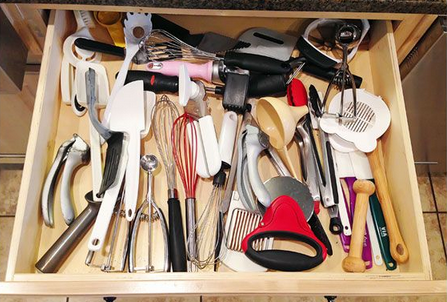Rummaging – Interpreting Behaviors With Dementia
Rummaging
Interpreting Behaviors to Provide Meaning
and Purpose in the Lives of
Loved Ones with Dementia
By: Jennifer Brush, M.A, CCC/SLP, www.BrushDevelopment.com
Henry walked into the darkened kitchen, felt for the knob and opened the drawer to the left of the sink. He pushed the utensils from side to side, touching and removing each one, inspecting the spoons and spatulas, then shaking his head before placing each one back in a hurried, disorderly fashion. Slam! “Not in here” he uttered as he moved to open the next drawer.

“What in God’s name are you doing in here so early? It’s not even five o’clock. Stop that and come back to bed!” Yelled his wife, Evelyn as she stomped back into the bedroom.
Unfortunately this scene is all too common for homes in which someone is living with dementia. Henry’s wife, Evelyn, is exhausted. She is tired of being awakened early in the morning by the slamming of drawers and weary from trying to convince her husband to go back to bed. She is drained of energy by putting her household back into place each day after Henry rearranges everything. Thinking she was being clever, Evelyn tried removing everything from the kitchen drawers except for the few most needed items, but that seemed to make Henry even more agitated. What can she do to make this stop? She doesn’t want Henry to live in a nursing home, but truly she can’t live like this much longer.
Often when reacting to behaviors of someone with dementia, family members respond by removing the item that is being used inappropriately or by restricting movement because of safety concerns, but this is not always the best solution. Let’s consider Henry’s situation. Evelyn’s immediate reaction is to ask him to stop, but what if she took a step back for a moment and thought of her husband in his younger years. Henry had an active career as a teacher, and he could fix anything. He loved puttering in the garage, building window boxes and bird houses for the garden and growing vegetables. It is very likely that Henry is looking for one of his tools or something to do each morning when his rummaging in the kitchen. What appears to be irrational and random is actually an effort at having meaning and purpose in his life. If he has always liked fixing things, perhaps he wants to feel useful or helpful. We all like to have something meaningful to do.

Henry may not be able to use power tools, build a complicated bird house, or change the oil in the car anymore, but given the opportunity and if needed, a bit of assistance, Henry could sand and paint an already constructed bird feeder, pick the vegetables, and wash the car. A card table set up in the kitchen with items to repair, sand, paint or assemble would probably hold Henry’s attention and create a useful distraction from rummaging in the utensil drawers. If Evelyn redirects Henry’s energies toward his natural abilities and offers him choices of things to do based on his past interest and habits, she will begin to establish balance and harmony in the home. If there was an ongoing project on the kitchen table for Henry, he may work on that instead of disturbing the utensils.

When our loved ones act in strange ways, it is very easy, and understandable to become frustrated. However, our anger isn’t going to make the person feel better or act differently. In most cases, the person will respond to this negativity by becoming apathetic, frustrated, aggressive or defensive. Try to keep in mind that this person is living every day with a disease that is causing the brain to malfunction, to operate while it is broken. It is like trying to complete a puzzle when some of the pieces are missing. Instead of being angry, view the behaviors of someone with dementia as a form of communication. The word dementia often carries a reputation for causing negative, bad, or disruptive behaviors. However, while these actions may seem negative to us, they are often just the method people with dementia use to express feelings or needs when words fail them.
When we imagine ourselves in someone else’s shoes and try to view the world through his or her eyes, we are better able to interpret the behaviors. Think about how your loved one lived, his or her hobbies, interests, and profession, and how those lifelong habits can be contributing to present behaviors.
Ask yourself “Why is this behavior happening?” Is the person afraid? Hungry? Bored? In pain? Looking for someone? Often the person is experiencing something uncomfortable and is unable to describe it. Other times a person with dementia remembers routines from the past such as caring for children or going to work, and is trying to complete those familiar tasks once again.
When a person cannot express why they are rummaging through drawers, trying to leave the house, etc., we need to solve the puzzle of their behavior by considering what we know about the person’s past preferences and habits. For example, it is not usual for a women with dementia to become anxious and state that she needs to leave to meet her young children at the bus stop. Rather than telling her that her children are all grown up and have children of their own, acknowledge her feelings, respect her love for her children, and redirect her to a task that has meaning for her. You might say, “I always look forward to hearing about my children’s day at school. We usually have a snack together and read a book. Would you like to help me make something to eat and then we can read together.” This acknowledges the person, allows her to maintain her dignity, and engages her in a familiar and enjoyable task.
We all appreciate having enjoyable things to do that bring purpose to our life, even people with dementia. Instead of removing objects, restricting movements, disagreeing, or correcting, always look for a reason for the behavior and a way to let the person engage in a meaningful activity that relates to their past. Most behaviors are just a means of communicating a need that isn’t met, and often the need is to be active, safe, useful, or busy.
Jennifer Brush, MA, CCC/SLP is a consultant and researcher in the area of dementia care and the author of I Care: A handbook for care partner of people with dementia. To learn more visit www.BrushDevelopment.com
Additional Resources For Dementia and Caregiving:




Wow. What a wonderful educational posting about repetitive behaviors. It is less frustrating to go along (as long as they are not hurting themselves for others) than to try to stop the behavior as this posting points out.
One of my clients cuts up newspapers about 4 hours each day. Her adult son is perplexed by this behavior, Yet it is easy to understand because his mother worked in an office from age 20-70. She calls her paper cutting “work.”
When she does not have enough paper, she cuts up family photos. Thus, I make sure she has an endless supply of catalogs and magazines with photos. Instead of dumping my catalogs in the recycling bin, I recycle them with her. It takes me less time to put them in my tote bag than take them outside. More importantly, her face light up when she sees my stack of catalogs when I arrive.
HI Ann
Thanks for writing. Sharing your story will help many.
Lori
Great article. “View the behaviors of someone with dementia as a form of communication,” – it’s very important to learn to listen with more than our ears so that we can help our loved ones with their needs. 🙂
Hi Mike
Yes this was a wonderful article. I can’t wait to see her new book!
Lori
This article resonates with me. I have frontotemporal dementia and am currently functioning fairly well although am unable to keep it together enough to work. I went on a trip with my sisters last summer and spent hours each day, rummaging through my suitcase in total frustration because I absolutely could not sort and organize my belongings. It was difficult to find things and I often forgot what I was looking for. Thanks to my little sister who bought gallon size zip lock bags and helped me to sort and label my stuff. I don’t think I could have done this on my own. Day to day I do ok at home but staying in several different places with five of us living out of our suitcases was very difficult for me. Thank God for sensitive and caring sisters who “get it!”
HI Rosie
Thank you so much for writing and sharing your story. I’m sure our audience will find great insights in your comment.
Thanks again!
Lori
Great thought provoking article. Has given me food for thought in helping my wife find things to do: dementia has robbed her of remembering how to fill time apart from doing household chores..
Thanks for taking the time to write. I loved the comment of the peanut allergy! Humor is always good, although I know peanut allergies can be extremely serious.
Have a wonderful holiday season
Lori